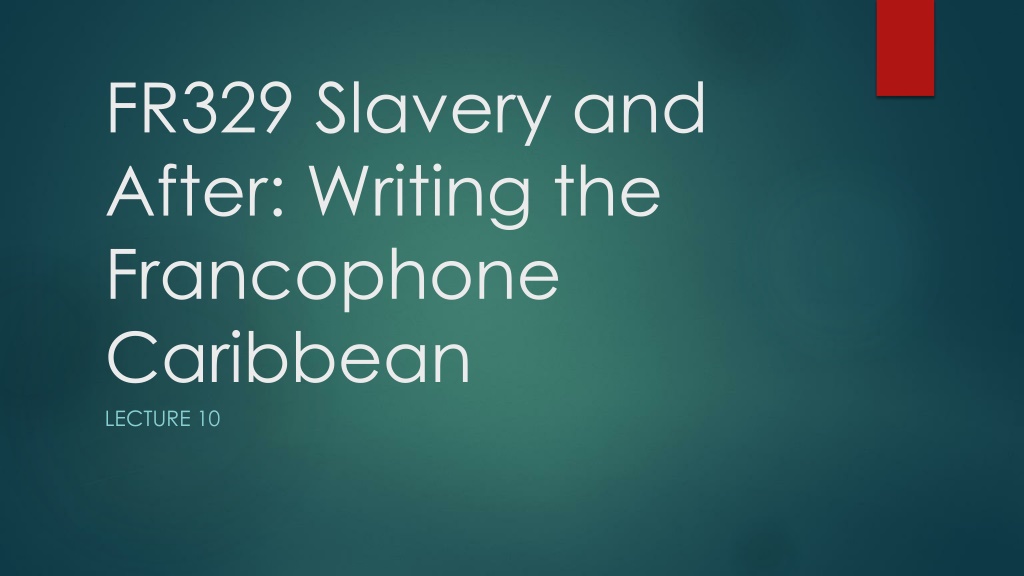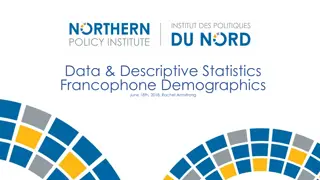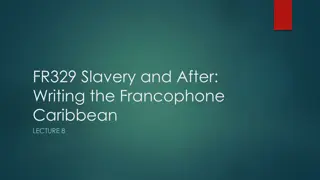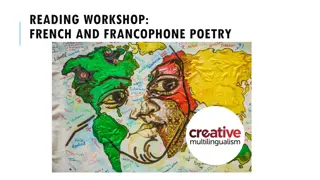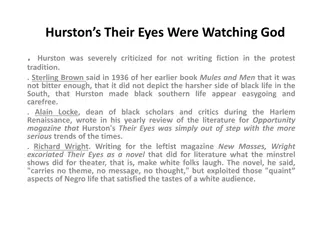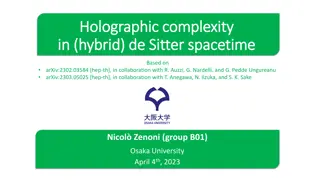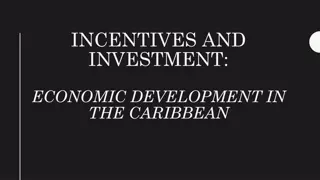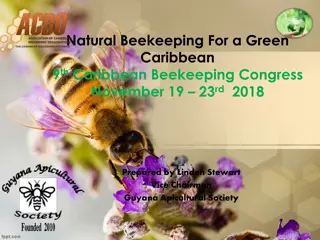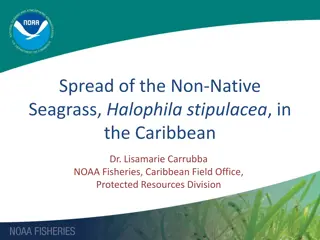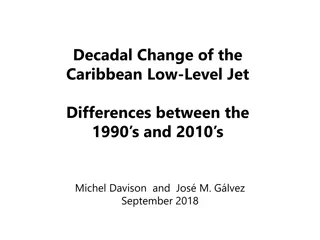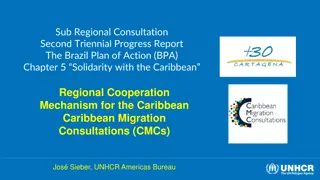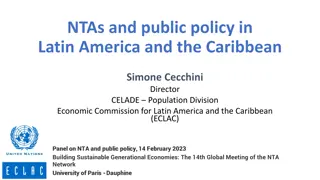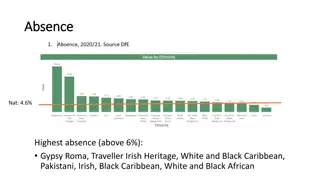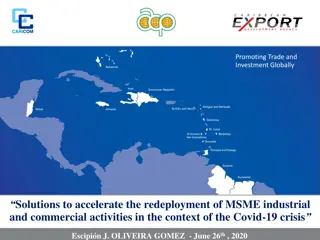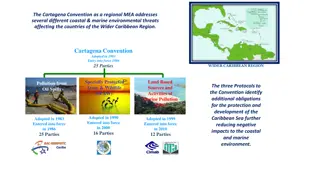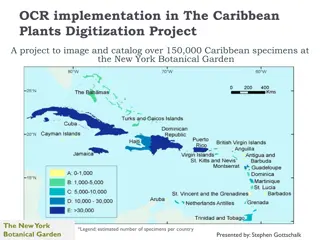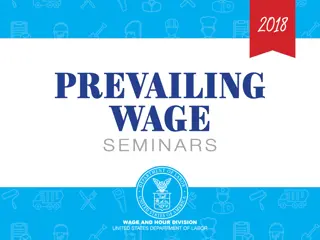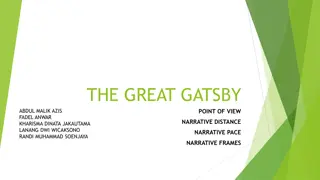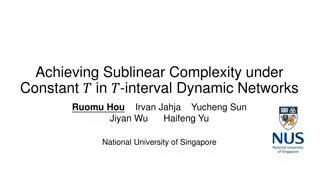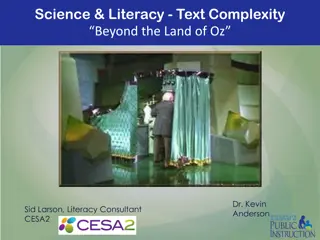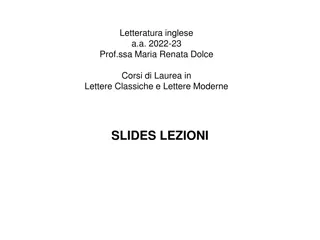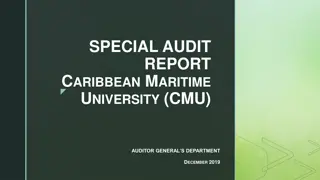Complexity of Narrative Construction in Francophone Caribbean Literature
Exploring the intricacies of narrative construction in Francophone Caribbean literature, this lecture delves into the distinctions between fabula and syuzhet, the impact of authors' authority on storytelling, and the portrayal of Caribbean subjectivity and authority. Through examples from notable postcolonial novelists, the lecture highlights the complex interplay between social constraints, cultural identity, and self-determination in the storytelling process.
- Narrative construction
- Francophone Caribbean
- Postcolonial novelists
- Cultural identity
- Self-determination
Download Presentation

Please find below an Image/Link to download the presentation.
The content on the website is provided AS IS for your information and personal use only. It may not be sold, licensed, or shared on other websites without obtaining consent from the author. Download presentation by click this link. If you encounter any issues during the download, it is possible that the publisher has removed the file from their server.
E N D
Presentation Transcript
FR329 Slavery and After: Writing the Francophone Caribbean LECTURE 10
LIle et une nuit Tragedy : cyclone//fate Narrative( fabula )vs. narration ( syuzhet ) : see distinction established by Russian Formalists (Vladimir Propp, Roman Jakobson) and then French Structuralist narratologists (G rard Genette, Tzetan Todorov, Roland Barthes): rules governing genres and basic building blocks narrators and narrative voice see Cahier, Vieil homme, Victoire = significant Postcolonial novelists and the omniscient narrator // authorship and authority = mirror the colonial situation 19thC: rise of the novel and decisive rise of the Imperial West
Simple narrative [the cyclone] but complex narration Teresa de Lauretis, in one of the most influential attempts to combine a discursively constructed subject with an emphasis on conscious strategy and resistance, outlines the possibility of a subject in the two senses of the term: both subject-ed to social constraint and yet subject in the active sense of maker as well as user of culture, intent on self- definition and self-determination . C. Britton, The (De)Construction of Subjectivity in Daniel Maximin s L lle et une nuit , Paragraph, 23 (3), 2001, pp. 44-58 (47). See Cahier, Vieil homme, Victoire, and M-G Seven hours // Vieil homme Intertextual links with other novels of the trilogy Marie-Gabriel and Caribbean/Afro- Caribbean culture and history (Delgr s) Narration: disrupts the visibility and the readability of cause-effect relationships occurring in time and space Personal pronouns and Caribbean subjectivity/authority (see Fanon s white masks and Sartre s inauthentic selfhood) - Marie- Gabriel: a subject in process
Premire heure nous - collective memory: hurricanes and the island s history (and slavery) see in Deuxi me heure : Dehors, le cyclone continue repasser nos d sastres sans lendemains. Les chiens du vent aboient contre mes portes ferm es (p. 58). But also the island s community see other characters
Deuxime heure M.-G. (the poet) and deferential vous
Troisime heure M-G dialoguing with a tu = Adrien, the absent lover Hurricane = devastating but conduit for renewal: je n ai pas encore perdu l espoir d un enfant (p. 65) and [ ] tu peux comprendre mon pur d sir d un enfant demain, ici m me aupr s de moi. C est- -dire l invention d une pr sence de futur imparfait (p. 65) = no perfect/finished/determined future = no repetition of past traumas
Quatrime heure Sim a // Suzanne C saire : Tropiques (1941- 45) with A. C saire, Astride Maug e and Ren M nil. Third person narrator M.-G. as part of a lineage of strong women - so move away from voicelessness //Victoire [+ Vieil homme] Leo Frobenius Against assimilation in literature Sim a diary, 1928 hurricane (but abortion); Sim a & M-G linked to cycle of hurricanes Caribbean poetry and Caribbean environment. see: Le Grand Camouflage. crits de dissidence (1941/1945), with a preface by D. Maximin. Sim a s voice survived the tragedy: The cyclone (lui): reconna tre une m me voix des ann es-cyclones de distance, [ ] l h ritage d une intonation, d un timbre, d un rythme ou d un accent de la voix de sa m re perdue (p. 81). Non- semantic quality of this memorial process Sim a s death whilst giving birth: ma fille, mon enfant de c ur, je te ferai rena tre de cette mort avort e (p. 80).
Cinquime heure Paul Gilroy refers to Jewels brought from bondage Cinqui me heure : M.-G. addressed as tu by music/ Louis- Gabriel = M-G s late father (rootless musician) Musicians vs. storytellers (Glissant + Cr olit authors) Jazz: the other language Afro-Caribbean music: part of the inter-textual deployment of the novel Jazz/ Afro-Caribbean music and reconciliation of opposites
Music the alternative language The invented traditions of musical expression which are my object here are equally important in the study of diaspora blacks and modernity because they have supported the formation of a distinct, often priestly caste of organic intellectuals whose experiences enable us to focus upon the crisis of modernity and modern values with special clarity. These people have often been intellectuals in the Gramscian sense, operating without the benefits that flow either from a relationship to the modern state or from secure institutional locations within the cultural industries. They have often pursued roles that escape categorisation as the practice of either legislators or interpreters and have advanced instead as temporary custodians of a distinct and embattled cultural sensibility which has also operated as a political and philosophical resource. The irrepressible rhythms of the once forbidden drum are often still audible in their work. Its characteristic syncopations still animate the basic desires-to be free and to be oneself that are revealed in this counterculture's unique conjunction of body and music. Music, the grudging gift that supposedly compensated slaves not only for their exile from the ambiguous legacies of practical reason but for their complete exclusion from modern political society, has been refined and developed so that it provides an enhanced mode of communication beyond the petty power of words-spoken or written. Paul Gilroy, The Black Atlantic: Modernity and Double Consciousness (1993), p. 76. See: Ce n est pas le moment de d senchanter (L Ile et une nuit, p. 125).
Sixime et septime heures nous, c est toi et moi (151) M.-G. and Adrien Third person narrator Sim a and M.-G. juxtaposed mythological and historical overtones - Mais alors, qui donc a fait la mer? (135, 139, 144).
